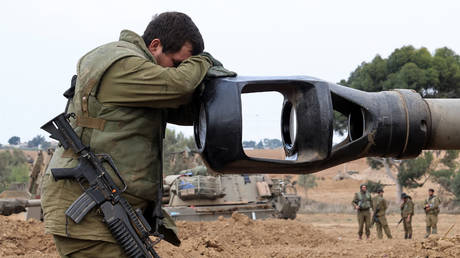
Every Palestinian killed by the IDF will be used by Hamas as a martyr to rile up the Arab world
Not since the founding of Israel in 1948 had Tel Aviv suffered as audacious an assault on its soil as the one carried out by the Palestinian Islamist militant group Hamas on October 7, which was more shocking than the Yom Kippur War of 1973.
The fact that Hamas had planned such a massive assault by land, sea and air and managed to avoid detection points to a massive intelligence failure by Israel.
Hamas appeared to have better knowledge about goings-on inside the country than the famed Israeli intelligence agency Mossad did about what was happening in Gaza. Israel’s Prime Minister, “Mr. Security” Benjamin Netanyahu, has certainly suffered a blow from which he may not be able to recover in the long run.
When Netanyahu came to power for the third time last December with the support of the country’s right-wing parties, both serving and retired Israeli Army generals expressed apprehension that such a coalition could lead to civil war in the country. That has not happened so far, but the division and months of protests against Netanyahu’s policies certainly emboldened Hamas to carry out its lightning strikes.
The very fact that Israel had to formally declare war was a morale booster for Hamas, which has been at war with the Jewish state ever since its inception when the first intifada, or Palestinian uprising, started in Gaza in December 1987. The world may be shocked by the unspeakable cruelty of the October attack by Hamas, but the Palestinian group is most likely proud of its accomplishment.
The fact that thousands of Palestinian civilians have lost their lives in the conflict probably doesn’t worry Hamas too much. They are likely to be declared martyrs – and when you are prepared to die for your cause, you are automatically bigger than your enemy. As of now, Palestinian authorities say they’ve lost count of the dead, but it’s above the 11,000 mark, of which well over half are believed to be women and children.
Efraim Halevy, whose career as the ninth Mossad director stretched from 1998 to 2002, urged caution as Israel stepped out to destroy Hamas. He warned that while Israel was entering a heightened state of emergency, the reservists were within their rights to refuse to serve in protest against PM Netanyahu’s planned judicial reforms.
Halevy, who was a confidant of the assassinated Israeli PM Yitzhak Rabin and played a key role in the Israel-Jordan peace treaty in October 1994, has always been in favor of negotiating with Hamas. He has consistently maintained that Hamas could neither be demolished nor wished away. Halevy, a nephew of the 20th century philosopher Isaiah Berlin (1909-1997), refused to accept Netanyahu as the leader of the country. Israel’s security chiefs also realize that destroying Hamas is beyond their abilities. As Israeli journalist and author Gideon Levy said, violence will never end Israeli problems.
Not much is known about the internal workings of Hamas, which remains extremely secretive. What is known, however, is that its goals are retaliation against Israel and its punishment, as well as the freeing of Palestinians languishing in Israeli jails. However, one of the key objectives of the October Hamas attack was the scuttling of the Abraham Accords, diplomatic normalization roadmaps signed between Israel and the Arab world in 2020 and brokered by the US.
Palestine remains a key sensitive issue in the Arab world. Even before the October 7 attacks and the ongoing retaliation, hostilities had been growing between Israel and the West Bank, particularly at the Al-Aqsa Mosque in Jerusalem, the third holiest site in Islam, where Palestinians are regularly assaulted and mistreated by the Israeli security forces. Issues like the killing of Al Jazeera journalist Shireen Abu Akleh by Israeli forces have kept widespread resentment simmering.
The Arab countries immediately banded together following Israel’s indiscriminate bombing of Gaza. Even Queen Rania of Jordan has accused the West of war crimes. The conflict has also brought together Muslims elsewhere in the world. Hamas takes pride in representing the Palestinian cause and considers itself as a growing power in the Arab world.
During his whirlwind trip to Israel soon after the start of the war, US President Joe Biden appealed to the Israelis not to be “consumed” by rage in response to the attack by Hamas. Even if this never translated into him making any attempt to restrain Israel’s actions, the US president knows what he is talking about. After the September 11, 2001 terrorist attacks, Washington launched wars in Afghanistan and Iraq, which turned out to be massive blunders. More than 30,000 US troops took their own lives after serving in Iraq and Afghanistan, over three times the number killed in battle.
The social wreckage caused by the wars the US fought after 9/11 led to the rise of President Donald Trump in 2016. An extended conflict in the Middle East may help him return to power in next year’s US presidential elections.
The current Israel-Hamas war has all the makings of such a long-term conflict – or a new, long-term stage of a conflict that has been simmering and flaring up for decades. In the past few weeks, Israel has claimed the killing of three Hamas commanders. In Afghanistan, too, the West kept claiming that it had killed Taliban commanders but fresh faces kept emerging. The US went into Afghanistan in 2001 with the goal of toppling the Taliban, but when they left 20 years later, the Taliban took power, more powerful than ever. Hamas, too, may end up more powerful 20 years from now.
Political issues cannot be swept under the carpet and must be dealt with politically. Governments around the world proclaim that they will never negotiate with evil. And yet they always have and always will, most of all Israel. No conflict, however bloody, ancient or difficult, is unstable.
Most recently, Israel and Hamas have struck a hostage release agreement, under which 50 people abducted during the October 7 attack will be released during a four-day humanitarian pause.
Key to that deal was the mediation by Qatar, an ally of the US and in a sense, the conscience-keeper of the Arab world. In the past, Doha had worked out the deal with the Taliban and helped US forces move out of Afghanistan before the Taliban arrived. More recently, Qatar was instrumental in a prisoner swap between the US and Iran.
After the four-day pause, the IDF has vowed to continue its attacks on Gaza, but if a longer-term peace deal is to be achieved, Qatar is likely going to play a vital role in it.
The US has always supported Israel, but has no great respect for PM Netanyahu. Biden has been disappointed that Netanyahu went back on the 1993 Oslo Accords and reneged on the two-state formula to resolve the Palestinian issue. Today, the Oslo Accords are long dead and may no longer be relevant.
The great Palestinian thinker, Edward Said (1935-2003) always saw the fate of Jewish and non-Jewish inhabitants of Palestine inextricably linked. We need to listen to Said today.




